ThermoSphere Foil, the perfect complement for wooden floor finishes
Wooden flooring is continually growing in popularity and shows no sign of stopping. According to Rated People’s Home Improvement Trends report 2021, wooden flooring ranked 4th in the top home improvement jobs. Also, the same report highlighted that the installation of electric underfloor heating ranked 4th in the top eco jobs posted, no surprises as the two go hand in hand.
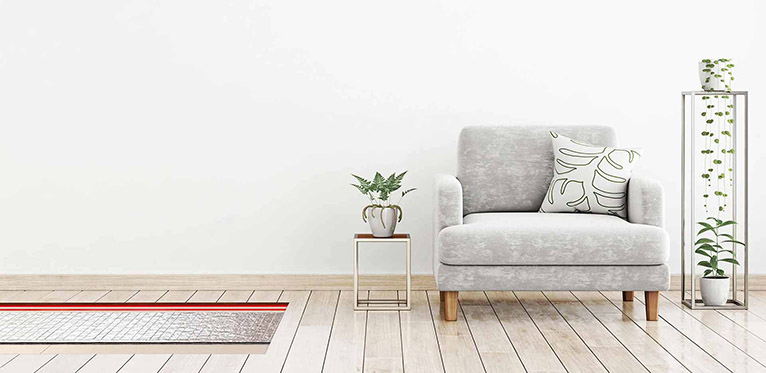
Electric underfloor heating isn’t just a ‘nice-to-have’ anymore as it was thought of as an expensive luxury. Technological evolution and the growth of better energy efficient systems have made electric underfloor heating more accessible, but how much does it really cost to run electric underfloor heating?
Additionally, with the launch of SAP 10 just around the corner, electric heating is becoming the preferred choice for new build projects. The current iteration of SAP 10 will significantly reduce the carbon emission factor for electricity from 0.519 kgCO2/kWh to 0.136 kgCO2/kWh, making the carbon emission rate of electric heating much lower than gas. This will make electric heating the most environmentally friendly and best performing heating method for EPC ratings. See ThermoSphere’s latest report on Heating systems and the environment.
What you need to know about electric underfloor heating and wooden floors:
Most wooden flooring types can be used with an electric underfloor heating system but their suitability depends on the density and moisture content of the board so manufacturers guidelines must be adhered to.
Expansion and contraction
All wood is hygroscopic, meaning it absorbs moisture, the moisture causes the wood to contract and expand over time. Both timber (natural hardwood) and engineered wood will be affected by moisture. Depending on the kind of timber you’re choosing and the environment of your project location the moisture content can vary. Also, depending on the time of year, a timber floor will expand and contract due to the indoor humidity changing. The floor must be laid to allow movement, otherwise it can bow and even crack. Then the benefits of a warm heated floor will be lost.
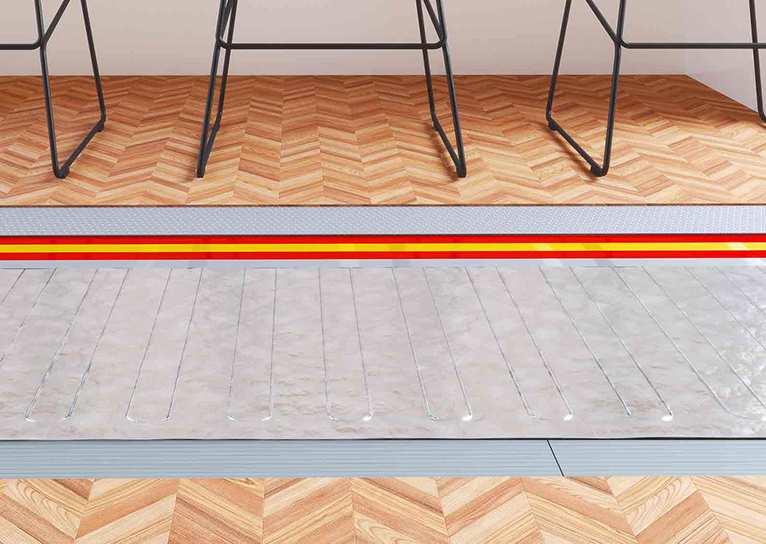
The ideal thickness of boards
The ideal thickness of wooden boards is between 12 – 15mm, with 18mm being the maximum. The thicker your wooden floorboards, the longer it will take to heat up your room to the optimum temperature, which could lead to higher running cost. The recommended ratio of thickness to width should be in the range of 7 to 11. An example would be a board with a thickness of 16mm and width of 160mm would give a ratio of 10, which is perfect. It is always important to check the suitability of a wooden floor with electric underfloor heating by contacting the flooring manufacturer.
Thermal conductivity
A floor surface temperature of 27°C shouldn’t be exceeded. This temperature is now an industry-wide recommendation, due to it being classed as the ‘ideal temperature’ based on historic research exploring growth and shrinkage rates. At 27°C the expansion was deemed ‘invisible’ to the naked eye and so is now industry standard.
The best wooden floor type for underfloor heating
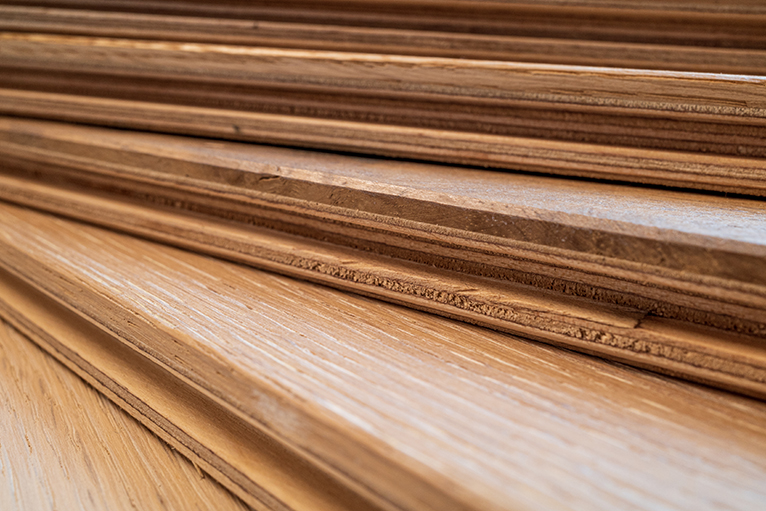
Engineered wooden boards are ideal for underfloor heating, due to the core being made up of layers of ply and finished with a solid wood top layer, this helps to reduce the expanding and contracting caused by moisture. Ideally, the thickness of the top layer of the board should not exceed 5mm and the entire board thickness to not exceed 18mm as previously mentioned. Depending on the circumstance it can be recommended that the boards are glued together upon installation. This is to help mitigate any risks caused by temperature changes.
The electric underfloor heating system you should use
ThermoSphere Foil is the safest and most advanced electric underfloor heating system, which costs less than one average takeaway coffee to run 2m² of electric underfloor heating for one month. It is designed to heat engineered timber, laminate, carpet, or vinyl floor finishes. It is only 1.5mm thick so there is minimal impact on floor height, the total floor build-up (excluding the floor finish layer) is only 7mm!
ThermoSphere Foil is designed for durability, creating a long-lasting installation with efficient heat transfer. The double layer of foil is specifically designed to protect the heating element and achieve an even spread of heat to the floor above. ThermoSphere Foil is the only heating foil with a continuous earth braid to ensure complete protection and safety.
ThermoSphere Foil was the first fully earthed foil system in the UK to feature protected and accessible cable loops which helps to simplify the ‘cut and return’ process during installation, ensures heat transfer is not lost and provides protection for the heat element after installation is complete.
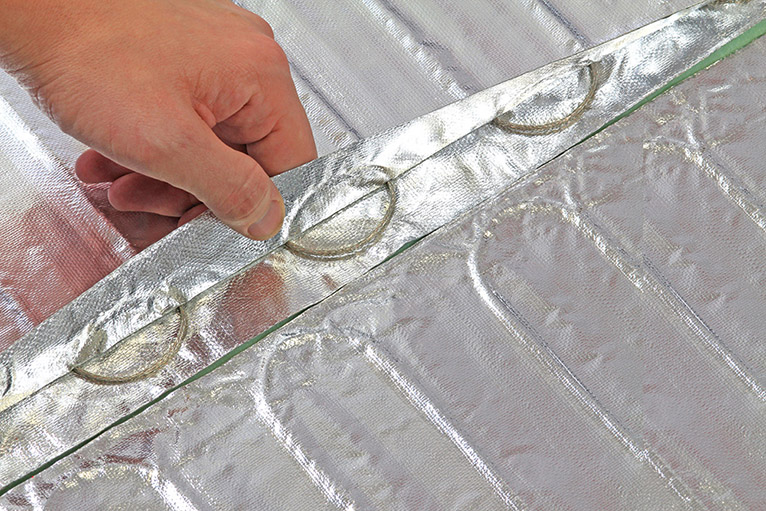
Foil electric underfloor heating reduces impact sound
Hard floors without isolation between the covering and floorboards creates increased impact sound. For impact sound including footsteps, an acceptable level of 62dB is set for floors in new builds and 64dB for conversions as set out in Part E (Resistance to Sound) of the Building Regulations.
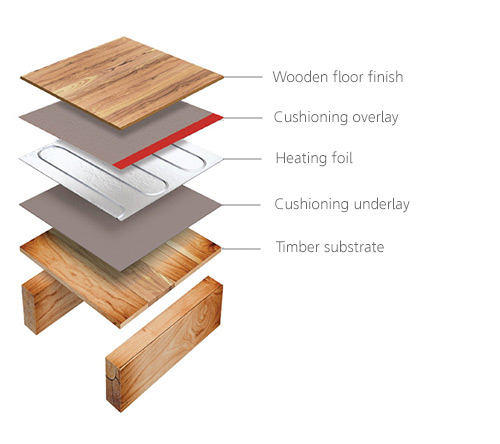
Our Foil contains a 1.2mm cushioning overlay (slip layer), this protects the heating cables from abrasion. An additional, 5mm cushioning underlay further protects the heating cable and reduces further abrasion by creating a snug fit to the protected layer. Combining these two layers gives 21dB in impact sound reduction.
Foil in action: Premier House
A 1960‘s concrete frame office building which was converted into 119 luxury residential apartments over 13 floors. Two key elements were a low floor build-up and reduced impact sound.
Foil was the perfect solution for the client’s requirements enabling perfect room heights no matter the constraints of the structure. Importantly the acoustic improvement surpassed the building requirements stipulated by building control. Read the full case study
For further information on ThermoSphere Foil and the complete electric heating range visit www.thermosphere.com or contact directly by calling 0800 019 5899.




